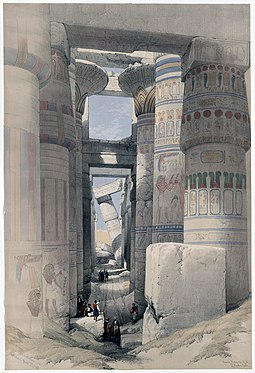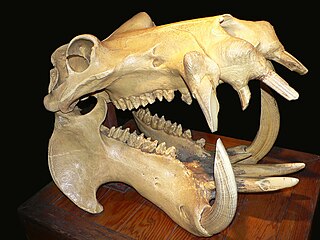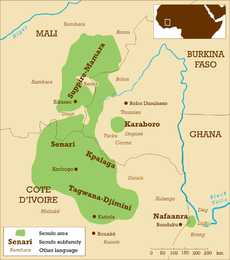Portal:Africa



Africa is the world's second-largest and second-most populous continent after Asia. At about 30.3 million km2 (11.7 million square miles) including adjacent islands, it covers 20% of Earth's land area and 6% of its total surface area. With nearly 1.4 billion people as of 2021, it accounts for about 18% of the world's human population. Africa's population is the youngest among all the continents; the median age in 2012 was 19.7, when the worldwide median age was 30.4. Based on 2024 projections, Africa's population will reach 3.8 billion people by 2099. Africa is the least wealthy inhabited continent per capita and second-least wealthy by total wealth, ahead of Oceania. Scholars have attributed this to different factors including geography, climate, corruption, colonialism, the Cold War, and neocolonialism. Despite this low concentration of wealth, recent economic expansion and a large and young population make Africa an important economic market in the broader global context. Africa has a large quantity of natural resources and food resources, including diamonds, sugar, salt, gold, iron, cobalt, uranium, copper, bauxite, silver, petroleum, natural gas, cocoa beans, and.
Africa straddles the equator and the prime meridian. It is the only continent to stretch from the northern temperate to the southern temperate zones. The majority of the continent and its countries are in the Northern Hemisphere, with a substantial portion and a number of countries in the Southern Hemisphere. Most of the continent lies in the tropics, except for a large part of Western Sahara, Algeria, Libya and Egypt, the northern tip of Mauritania, and the entire territories of Morocco and Tunisia, which in turn are located above the tropic of Cancer, in the northern temperate zone. In the other extreme of the continent, southern Namibia, southern Botswana, great parts of South Africa, the entire territories of Lesotho and Eswatini and the southern tips of Mozambique and Madagascar are located below the tropic of Capricorn, in the southern temperate zone.
Africa is highly biodiverse; it is the continent with the largest number of megafauna species, as it was least affected by the extinction of the Pleistocene megafauna. However, Africa is also heavily affected by a wide range of environmental issues, including desertification, deforestation, water scarcity, and pollution. These entrenched environmental concerns are expected to worsen as climate change impacts Africa. The UN Intergovernmental Panel on Climate Change has identified Africa as the continent most vulnerable to climate change.
The history of Africa is long, complex, and varied, and has often been under-appreciated by the global historical community. In African societies the oral word is revered, and they have generally recorded their history via oral tradition, which has led anthropologists to term them oral civilisations, contrasted with literate civilisations which pride the written word. During the colonial period, oral sources were deprecated by European historians, which gave them the impression Africa had no recorded history. African historiography became organized at the academic level in the mid-20th century, and saw a movement towards utilising oral sources in a multidisciplinary approach, culminating in the General History of Africa, edited by specialists from across the continent. (Full article...)
Selected article –

West Africa, also called Western Africa, is the westernmost region of Africa. The United Nations defines Western Africa as the 16 countries of Benin, Burkina Faso, Cape Verde, The Gambia, Ghana, Guinea, Guinea-Bissau, Ivory Coast, Liberia, Mali, Mauritania, Niger, Nigeria, Senegal, Sierra Leone, and Togo, as well as Saint Helena, Ascension and Tristan da Cunha (United Kingdom Overseas Territory). The population of West Africa is estimated at 419 million0 people as of 2021, and at 381,981,000 as of 2017, of which 189,672,000 were female and 192,309,000 male. The region is demographically and economically one of the fastest growing on the African continent.
Early history in West Africa includes a number of prominent regional powers that dominated different parts of both the coastal and internal trade networks, such as the Mali and Gao Empires. West Africa sat at the intersection of trade routes between Arab-dominated North Africa and further south on the continent, the source of specialized goods such as gold, advanced iron-working, and ivory. After European exploration encountered rich local economies and kingdoms, the Atlantic slave trade built on already existing slave systems to provide labor for colonies in the Americas. After the end of the slave trade in the early 19th century, European nations, especially France and Britain, continued to exploit the region through colonial relationships. For example, they continued exporting a number of extractive goods, including labor-intensive agricultural crops like cocoa and coffee, forestry products like tropical timber, and mineral resources like gold. Since independence, many West African countries, like Ivory Coast, Ghana, Nigeria and Senegal, have played important roles in the regional and global economies. (Full article...)
Featured pictures –
Did you know (auto-generated) -

- ... that 555 Edgecombe Avenue, once named for a British soldier and occupied entirely by white Americans, later attracted notable African Americans like Paul Robeson and Count Basie?
- ... that a former member of the French Senate ended up being exiled to the northern Central African Republic by the future emperor?
- ... that Louise Fulton was the first African American to win a professional bowling tournament?
- ... that the lenient sentencing of two Europeans convicted in 1918 after the death of a black man in the East Africa Protectorate led to inquiries from the British Colonial Office?
- ... that a lack of screening for pregnant women with syphilis in sub-Saharan Africa is associated with increased infant mortality?
- ... that Saint Augustine died during the Vandal conquest of Roman Africa?
Categories
Selected biography –
Denis Mukwege (/mʊkˈweɪɡi/; born 1 March 1955) is a Congolese gynecologist and Pentecostal pastor. He founded and works in Panzi Hospital in Bukavu, where he specializes in the treatment of women who have been raped by armed rebels. In 2018, Mukwege and Iraqi Yazidi human rights activist Nadia Murad were jointly awarded the Nobel Peace Prize for "their efforts to end the use of sexual violence as a weapon of war and armed conflict".
Mukwege has treated thousands of women who were victims of rape as a weapon of war since the Second Congo War, some of them more than once, performing up to ten operations a day during his 17-hour working days. According to The Globe and Mail, Mukwege is "likely the world's leading expert on repairing injuries of rape". In 2013, he was awarded the Right Livelihood Award for "his courageous work healing women survivors of war-time sexual violence and speaking up about its root causes." (Full article...)
Selected country –
 |
 |
||

| |||
Namibia, officially the Republic of Namibia, is a country in southern Africa on the Atlantic coast. It shares borders with Angola and Zambia to the north, Botswana to the east, and South Africa to the south. It gained independence from South Africa in 1990 and its capital city is Windhoek (German: Windhuk). It is divided into 13 regions and subdivided into 102 constituencies. Namibia is a member state of the United Nations (UN), the Southern African Development Community (SADC), the African Union (AU), and the Commonwealth of Nations.
The politics of Namibia takes place in a framework of a presidential representative democratic republic, whereby the President of Namibia is elected to a five year term and is both the head of state and the head of government, and of a multi-party system. Executive power is exercised by the government. Legislative power is vested in both the government and the two chambers of parliament. The Judiciary is independent of the executive and the legislature. (Read more...)
Selected city –

Francistown is the second-largest city in Botswana, with a population of about 103,417 and 147,122 inhabitants for its agglomeration at the 2022 census. It is located in eastern Botswana, about 400 kilometres (250 mi) north-northeast from the capital, Gaborone. Francistown is located at the confluence of the Tati and Ntshe rivers, and near the Shashe River (tributary to the Limpopo) and 90 kilometres (56 mi) from the international border with Zimbabwe.
Francistown was the centre of Southern Africa's first gold rush and is still surrounded by old and abandoned mines. The City of Francistown is an administrative district, separated from North-East District. It is administered by Francistown City Council. The main language spoken and used in and around Francistown is Kalanga. Other languages used in the area are isiNdebele, ChiShona as well as SeTswana. Francistown is the only city in Botswana with an English name. There are no English-language named towns and only a couple of villages with English names. (Full article...)
In the news
- 5 February 2025 – War against the Islamic State
- A deadly battle between the Puntland Security Force and Islamic State results in the killing of 57 foreign militants in Dharin area of Bari Region, Puntland. (Garowe Online)
- 5 February 2025 – Somali Civil War
- Somali federal government-appointed commissioner of Bardhere District Mohamed Ilyas Caagane is killed after Somali National Army forces are defeated by Jubaland forces in Gedo, Somalia. (Garowe Online) (Hiiraan Online)
- 5 February 2025 – Kivu conflict
- The M23 rebels capture Nyabibwe, a town along the road to the South Kivu capital Bukavu, and the DR Congo government says that the unilateral ceasefire declared by M23 earlier was a lie. (AP)
- 5 February 2025 –
- A fire at an Islamic school in Kaura Namoda, Zamfara State, Nigeria, kills at least 17 people. (BBC News)
- 4 February 2025 – War against the Islamic State
- War in Somalia
- Puntland Security Forces battle ISIS militants near Dharin, killing at least 40 fighters and injuring others. They claim to have captured the village of Dharin in Togga Jecel of Bari Region, Puntland. (The Somali Digest) (Garowe Online)
Updated: 3:05, 6 February 2025
General images -
Africa topics
More did you know –
- ... that Safi Faye's 1975 film Kaddu Beykat was the first commercially distributed feature film made by a Sub-Saharan African woman?
- ... that legendary princess Yennenga, the "mother" of the Mossi people, was such a great warrior that her father refused to allow her to marry?
- ... that Safi Faye is a Senegalese film director whose work is better known in Europe than in her native Africa?
- ...that Mohamed Camara's 1997 film Dakan was the first West African film to explore homosexuality?
Related portals
Major Religions in Africa
North Africa
West Africa
Central Africa
East Africa
Southern Africa
Associated Wikimedia
The following Wikimedia Foundation sister projects provide more on this subject:
-
Commons
Free media repository -
Wikibooks
Free textbooks and manuals -
Wikidata
Free knowledge base -
Wikinews
Free-content news -
Wikiquote
Collection of quotations -
Wikisource
Free-content library -
Wikispecies
Directory of species -
Wikiversity
Free learning tools -
Wikivoyage
Free travel guide -
Wiktionary
Dictionary and thesaurus























































































